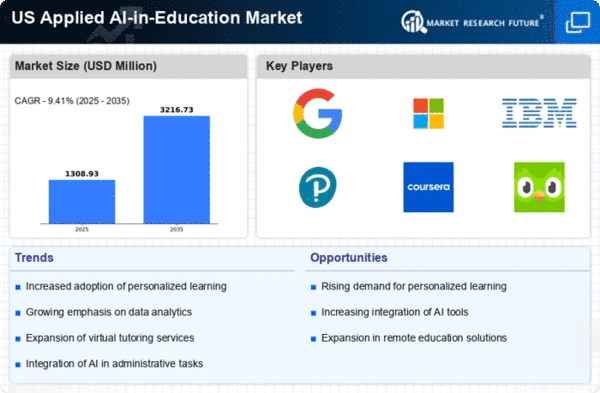Integration of AI Technologies in Curriculum
The integration of AI technologies into educational curricula is a pivotal driver for the applied ai-in-education market. Educational institutions are increasingly adopting AI tools to enhance learning experiences. For instance, AI-driven platforms can provide personalized learning paths, adapting to individual student needs. This trend is reflected in the growing investment in AI technologies, which reached approximately $1.5 billion in 2025. As schools and universities recognize the potential of AI to improve student engagement and outcomes, the demand for AI-integrated curricula is likely to rise. This shift not only enhances the learning process but also prepares students for a technology-driven workforce, thereby influencing the applied ai-in-education market significantly.
Rising Awareness of Data Privacy and Security
The rising awareness of data privacy and security issues is influencing the applied ai-in-education market. As educational institutions adopt AI technologies, concerns regarding the protection of student data have become paramount. Institutions are increasingly prioritizing the implementation of robust data security measures to comply with regulations and build trust with stakeholders. In 2025, it is projected that 60% of educational institutions will enhance their data privacy protocols in response to these concerns. This focus on data security not only safeguards student information but also encourages the adoption of AI solutions, thereby impacting the applied ai-in-education market positively.
Increased Demand for Remote Learning Solutions
The demand for remote learning solutions is a significant driver in the applied ai-in-education market. As educational institutions seek to provide flexible learning options, AI technologies are being utilized to facilitate remote education. This includes the development of intelligent tutoring systems and virtual classrooms that can adapt to various learning styles. In 2025, the market for remote learning solutions is projected to grow by 25%, indicating a robust interest in AI applications that support distance education. The ability of AI to analyze student performance and provide real-time feedback enhances the effectiveness of remote learning, making it a crucial component of the applied ai-in-education market.
Focus on Skill Development and Workforce Readiness
The emphasis on skill development and workforce readiness is driving the applied ai-in-education market. Educational institutions are increasingly aligning their programs with industry needs, utilizing AI to identify skill gaps and tailor curricula accordingly. This alignment is crucial as employers seek graduates with specific competencies. In 2025, it is estimated that 70% of educational institutions will incorporate AI tools to enhance career readiness programs. By leveraging AI, schools can provide students with relevant training and experiences, thereby improving employability. This focus on skill development not only benefits students but also strengthens the overall workforce, further propelling the applied ai-in-education market.
Government Initiatives and Funding for AI in Education
Government initiatives and funding aimed at promoting AI in education are vital drivers of the applied ai-in-education market. Various federal and state programs are being implemented to support the integration of AI technologies in schools. For example, funding allocations for educational technology have increased, with an estimated $500 million dedicated to AI initiatives in 2025. These initiatives aim to enhance educational outcomes and ensure equitable access to technology. As governments recognize the transformative potential of AI in education, the resulting financial support is likely to stimulate growth in the applied ai-in-education market, fostering innovation and development.
















